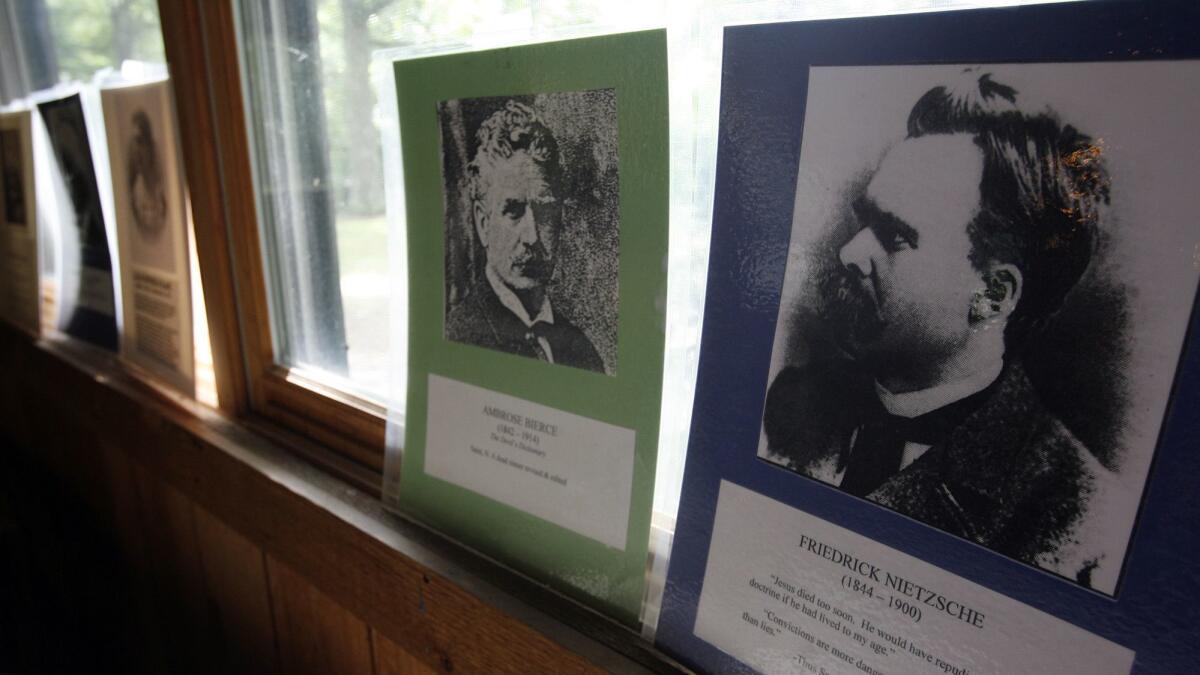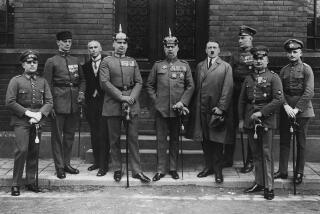Op-Ed: The alt-right misreads Nietzsche. But they aren’t the only ones

Richard Spencer, leading light of America’s alt-right, said in an interview last year that he was “red-pilled” by reading the philosopher Friedrich Nietzsche. The reference is to “The Matrix”; in the film, popping the red pill allows you to perceive reality. Scales fall from your eyes. Spencer’s recalibration threw up white nationalism, anti-feminism, racial and cultural purity.
But Nietzsche repeatedly wrote against all of the above. He insisted he’d rather be a good European than a good German, calling “Deutschland, Deutschland über alles” (“Germany, Germany above all”) the death of German philosophy. His numerous close friendships with early feminists included Meta von Salis, the first woman in Switzerland to gain a PhD. One of his last letters proposes all anti-Semites should be shot.
So how did Nietzsche come too be commonly perceived as a racist, misogynistic nationalist?
Two reasons. One: His proto-Nazi sister took charge of the legacy after his death. Two: He had a terrific talent for coining catchy phrases like the Übermensch and the blond beast. Read his blond beast passages, however, and you’ll discover there’s nothing racial in the phrase at all. It’s just his shorthand for our common ancestor, the lion-maned hunter who roamed the jungles of prehistory. The Übermensch, likewise, is not a biological concept. He is the person capable of overcoming the existential crisis induced by Darwinian science. God is dead but the Übermensch needs no religious purpose to find meaning in life. He finds affirmation in life itself: “Whatever doesn’t kill him makes him stronger.”
The irony of Nietzsche’s appropriation by the extreme right — then as now — is that his central interest never lay in political theory.
Spencer, who leads a white nationalist/separatist group, is the latest in a long line misappropriating Nietzsche for his own ends. It began in the 1890s, when Nietzsche’s sister Elisabeth took over his literary estate. Unlike her brother, Elisabeth was an unswerving racist, nationalist and anti-Semite. The siblings clashed politically starting in 1880, when Elisabeth petitioned Otto von Bismarck, chancellor of the German Empire, against Germany’s Jews. Later she trekked off to Paraguay to establish a “racially pure” colony unsullied by Semitic blood. Nietzsche was disgusted.
Unsurprisingly the colony went broke. Elisabeth went home in 1893 to find her brother famous Europe-wide, but insane. He lived seven more years, helpless in her care as she collected his unpublished papers, formed the Nietzsche Archive in Weimar and set about perverting his philosophy. Presenting him as the mystic prophet of her own convictions, Elisabeth cut and pasted his writings and letters. She censored; she forged; she suppressed; she even published an entire book in his name, “The Will to Power.”
Nietzsche died in 1900. Elisabeth lived until 1935, controlling access to the archive and putting out new publications.
The archive became a hub for the nascent National Socialist (Nazi) Party as Elisabeth appointed its ideologues to editorial and administrative posts. Alfred Baeumler — who would later supervise production of textbooks presenting theories of race and blood as fact, support the Nazification of the universities, and oversee the Berlin book burning — prepared Nietzsche’s texts for new editions. Martin Heidegger was a member of the Nazi Party when he joined Baeumler as editor in the archive. Together, they took the extraordinary view that Nietzsche’s previously published works hardly counted; his real philosophy resided in the other papers and literary fragments already manipulated by Elisabeth, that they would further distort.
The philosopher Oswald Spengler used Nietzsche to support his own belief in social Darwinism: the corruption of the theory of evolution through adaptation and natural selection into German racial supremacy, justifying eugenics and, eventually, the Final Solution. The catchy terms Übermensch, master morality and blond beast were gifts to men such as Spengler. His Übermensch was portrayed as the racially superior Aryan and the blond beast as the triumphant jackbooted storm trooper.
In 1932, Elisabeth finally met her hero. Adolf Hitler showed up when she staged a play by Benito Mussolini. He presented her with a huge bunch of roses. In return, she gave him a copy of her 1880 petition against Jews and her late brother’s walking stick. They became friends for life.
There’s no evidence Hitler studied Nietzsche. Leni Riefenstahl, who directed the movie of the 1934 Nuremburg Rally, “The Triumph of the Will,” recounts in her memoir asking Hitler about it. “No, I can’t really do much with Nietzsche,” he answered. “He is not my guide.”
Even among the Nazis in the archive, some realized the absurdity of their work. One propagandist, Ernst Krieck, remarked that apart from the fact that Nietzsche was not a socialist, not a nationalist and opposed to racism, he could have been a leading National Socialist thinker.
Elisabeth spent much of her last year of life in bed, having “Mein Kampf” read aloud to her. At her funeral she was hailed as mother of the nation. Hitler, now chancellor of Germany, sat in the front row, looking sad.
The irony of Nietzsche’s appropriation by the extreme right — then as now — is that his central interest never lay in political theory. He was chiefly interested in mankind’s spiritual evolution.
Enter the Fray: First takes on the news of the minute from L.A. Times Opinion »
Nietzsche was at school when Darwin published his theory of evolution, dynamiting the foundations of 2,000 years of Christian belief and culture and setting off a tsunami of nihilism and pessimism. This is what Nietzsche is referring to when he states that God is dead. In that context, has life lost its meaning? What does it mean to be unchained from a central metaphysical purpose?
The tug of war between Darwin and divine purpose continued throughout Nietzsche’s lifetime. Fossils! Geology! Scientific truth was the new wonder and seemed to offer a new certainty. Nietzsche spoiled the party by pointing out that scientific truth has the uncomfortable habit of shifting with every new discovery. It can offer no substitute for religious certainty, or tell us how we should behave. In an uncertain world, said Nietzsche, we must think through the principles we want to live by. Such questions about individual conscience are ones we are still asking today.
Part of Nietzsche’s enduring appeal lies in his unwillingness to provide a ready-made answer to the existential questions. We are meant to find answers for ourselves. This is the true accomplishment of the Übermensch. We might reject science as faith. We might reject religious faith but still create moral values. God may be dead but life has not lost its meaning.
It is tragic for Nietzsche that in the 1930s the need he identified — to overcome our existential despair in the wake of the death of God — became blatantly distorted into the need to overcome others. And it’s tragic that it is happening again today.
Sue Prideaux is the author of “I Am Dynamite! A Life of Nietzsche.”
Follow the Opinion section on Twitter @latimesopinionand Facebook
More to Read
A cure for the common opinion
Get thought-provoking perspectives with our weekly newsletter.
You may occasionally receive promotional content from the Los Angeles Times.










